Home-grown firm that turns coffee waste into furniture material one of 11 NEA award recipients
Sign up now: Get ST's newsletters delivered to your inbox
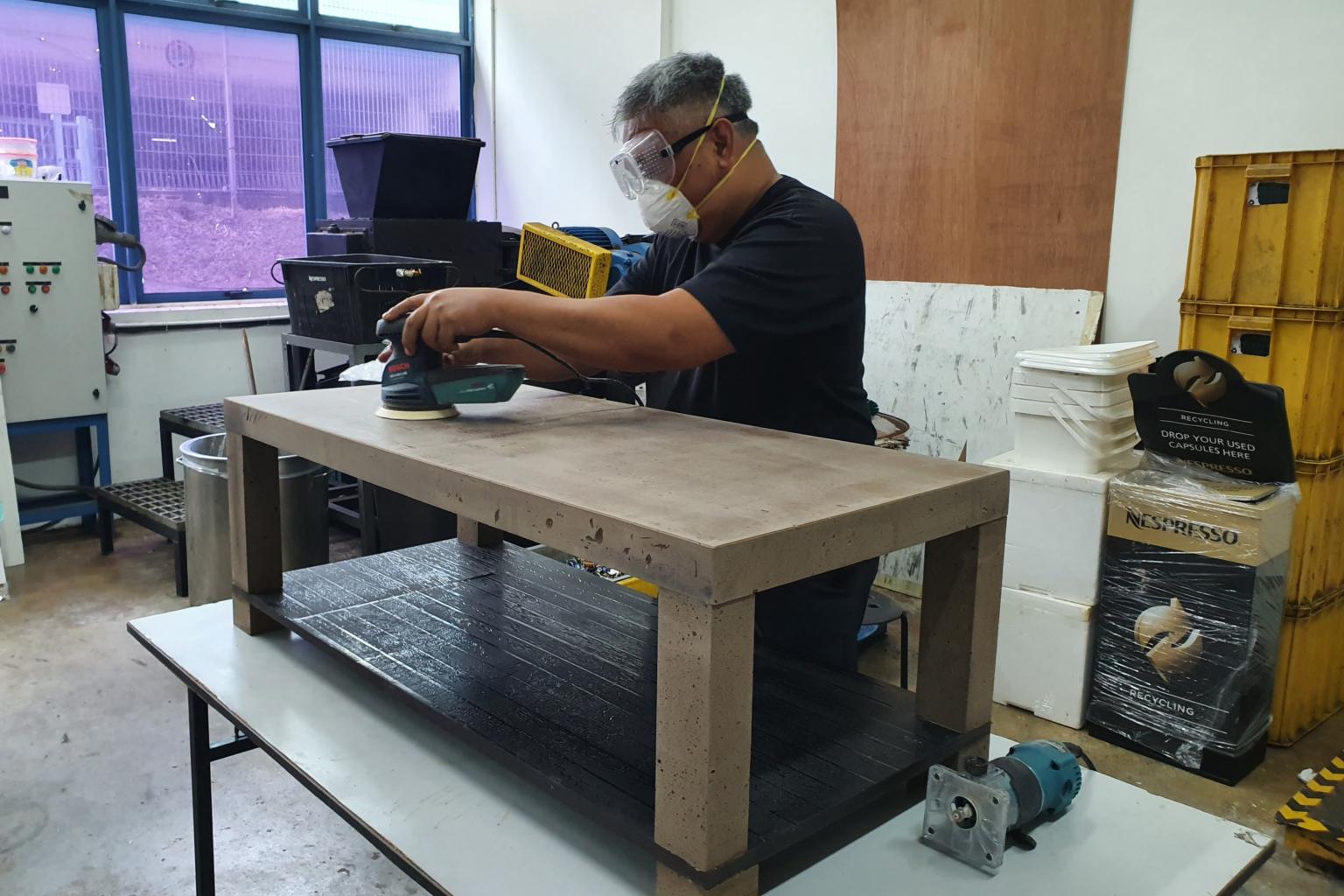
A1 Environment technical director Mohamad Ismail Ibrahim working on a table made of used coffee grounds.
PHOTO: A1 ENVIRONMENT
Follow topic:
SINGAPORE - This home-grown company collects sodden, used coffee grounds from cafes and hotels, and turns it into wood-like panels that can be used to make furniture.
The firm, A1 Environment, first removes contaminants such as coffee filters from the coffee by-product, then dries and processes the coffee grounds and mixes it with a binder so they can be shaped into fire-retardant panels.
Since 2019, A1 Environment has worked with local woodworkers and carpenters to build furniture and household items such as tables and shelves from the novel material.
For giving food waste a new lease of life, A1 Environment and 10 other firms were recipients of the inaugural Food Resource Valorisation Awards on Wednesday (Sept 29).
Food resource valorisation refers to the conversion of food waste into higher-value products. It is a preferred solution to reducing food waste compared to turning it into compost or liquid nutrients.
The awards were given out by the National Environment Agency (NEA).
A1 Environment business director Loh Yen-Lyng said by the end of next year, when the company has scaled up its processes, it plans to launch a range of furniture, in collaboration with the woodworkers. Items such as flower pots and corporate gifts will also be launched.
To date, the company has converted 650 tonnes of used coffee grounds into compost for local farms or the waterproof, durable panels that are harder than plywood.
On top of diverting coffee waste from landfill, the coffee-based panels can become an alternative material to wood, meaning fewer trees would be cut down, noted Ms Loh.
A few years ago, A1 Environment wanted to expand its business model, and widen the use of used coffee grounds beyond turning it into compost.
It worked with an expert from Nanyang Polytechnic to develop a proprietary formula to convert the used coffee grounds into material for furniture.
On winning the award, A1 Environment technical director Mohamad Ismail Ibrahim said: "Over nine years, we have put in a lot of effort in trying to reduce waste. Previously we were working with paper, plastics and other materials, but now we've moved into coffee... and the feedback from furniture-makers has been encouraging.
"The woodworkers and carpenters said the panels' function and durability surpassed their expectations, and that motivates us to produce the (coffee-based) panels in a larger scale."
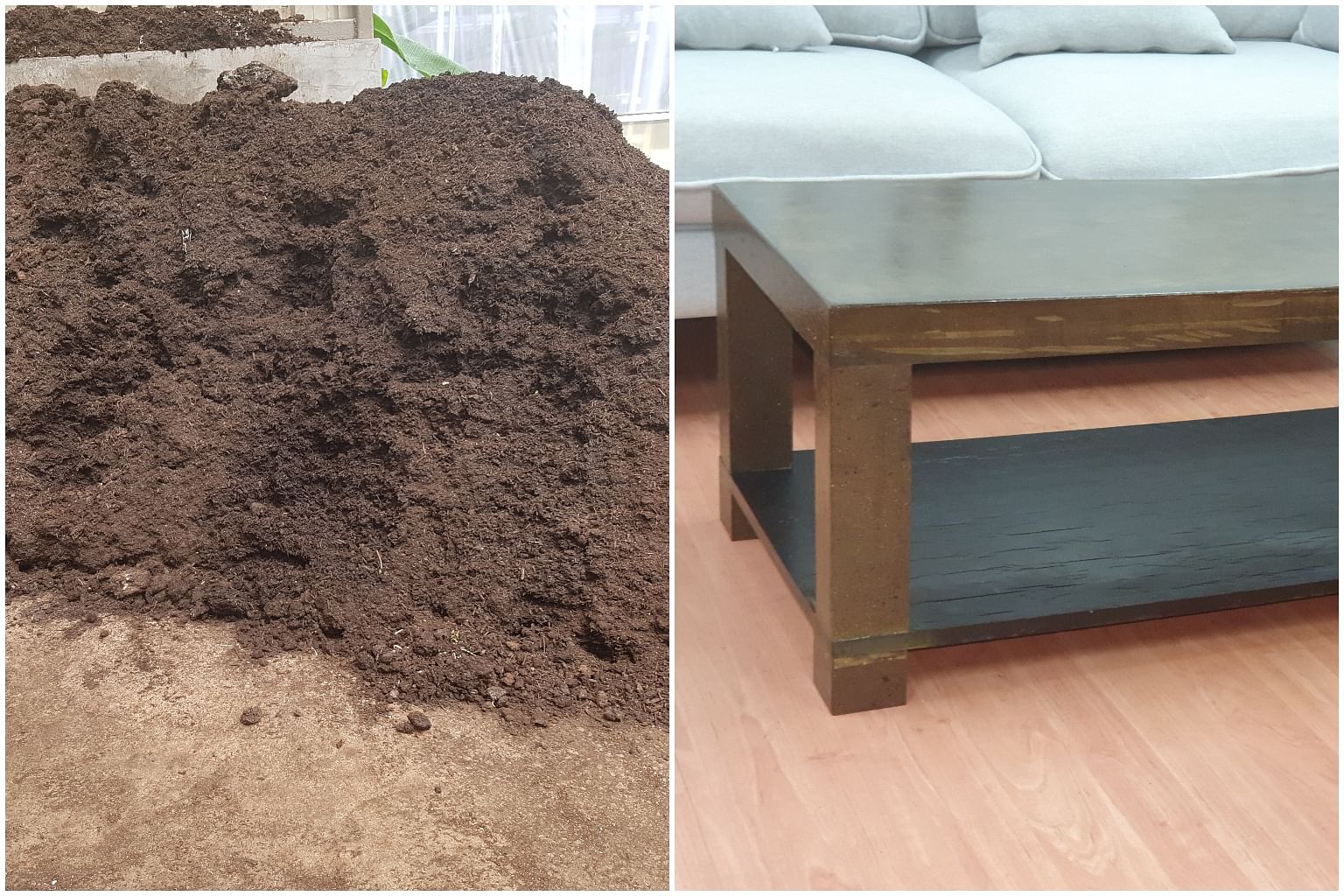
Also by the end of next year, the company will start exploring ways to convert other food waste, such as tea leaves and coffee husks, into furniture and household items.
Another award recipient, KosmodeHealth, turns spent barley grains into starchless, high-fibre noodles that do not cause an increase in blood sugar levels after consumption.
Spent barley grains - a waste product from beer breweries and malt factories here - are dried and processed into a fine protein fibre powder which is formulated into noodles. KosmodeHealth says its noodles have a taste and texture close to wheat noodles.
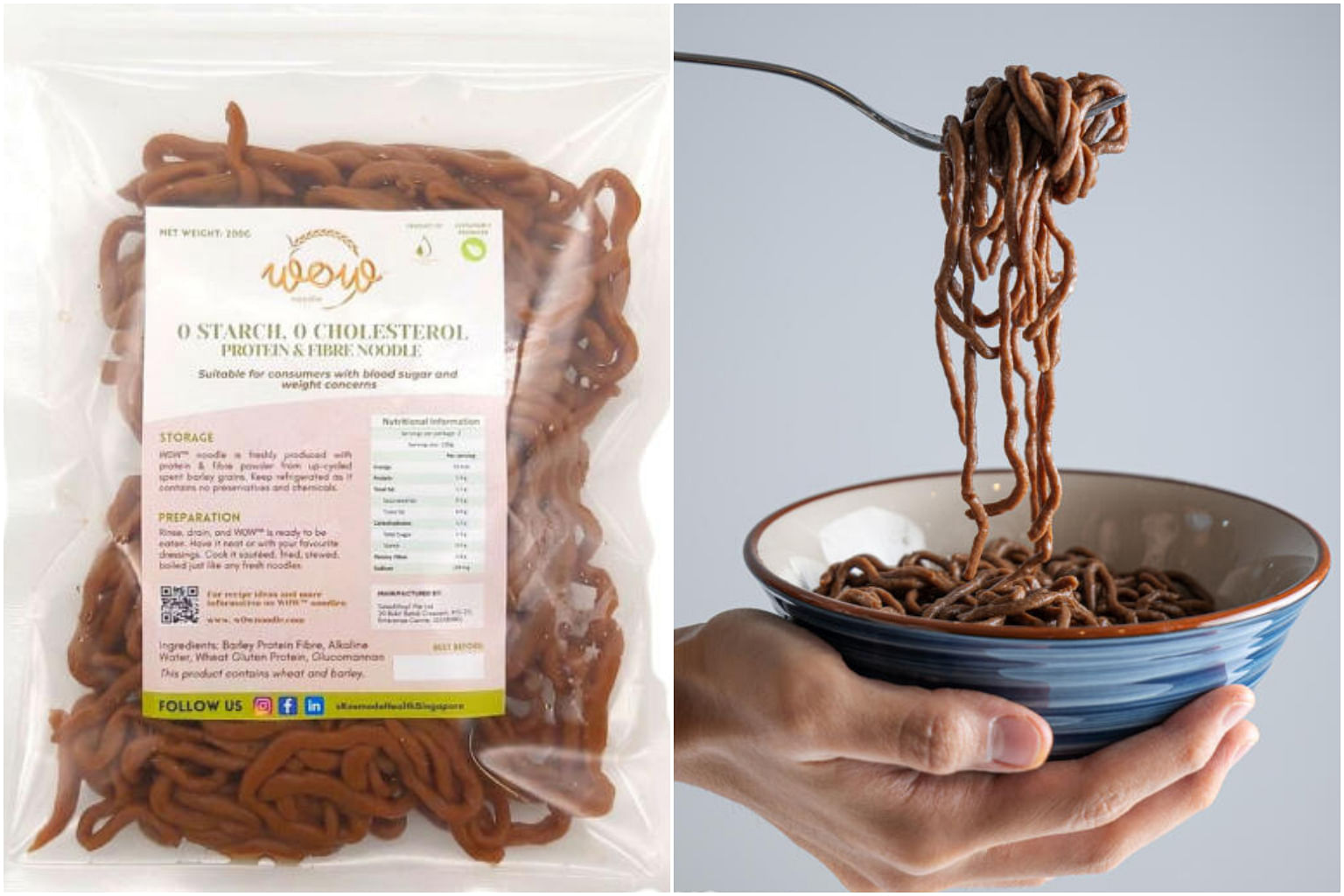
W0W noodle, prepared as a soba dish.
PHOTOS: KOSMODEHEALTH
Called W0W noodle, each 200g pack is sold online for $6.60.
KosmodeHealth is currently raising funds to build a pilot production facility so that it can process 100kg of spent barley grains into starchless noodles each day.
The 11 winners were selected based on the technologies they use, the value of their final products and the long-term viability of their businesses, among other criteria, said NEA in a statement on Wednesday.
In Singapore, food waste is one of the major waste streams.
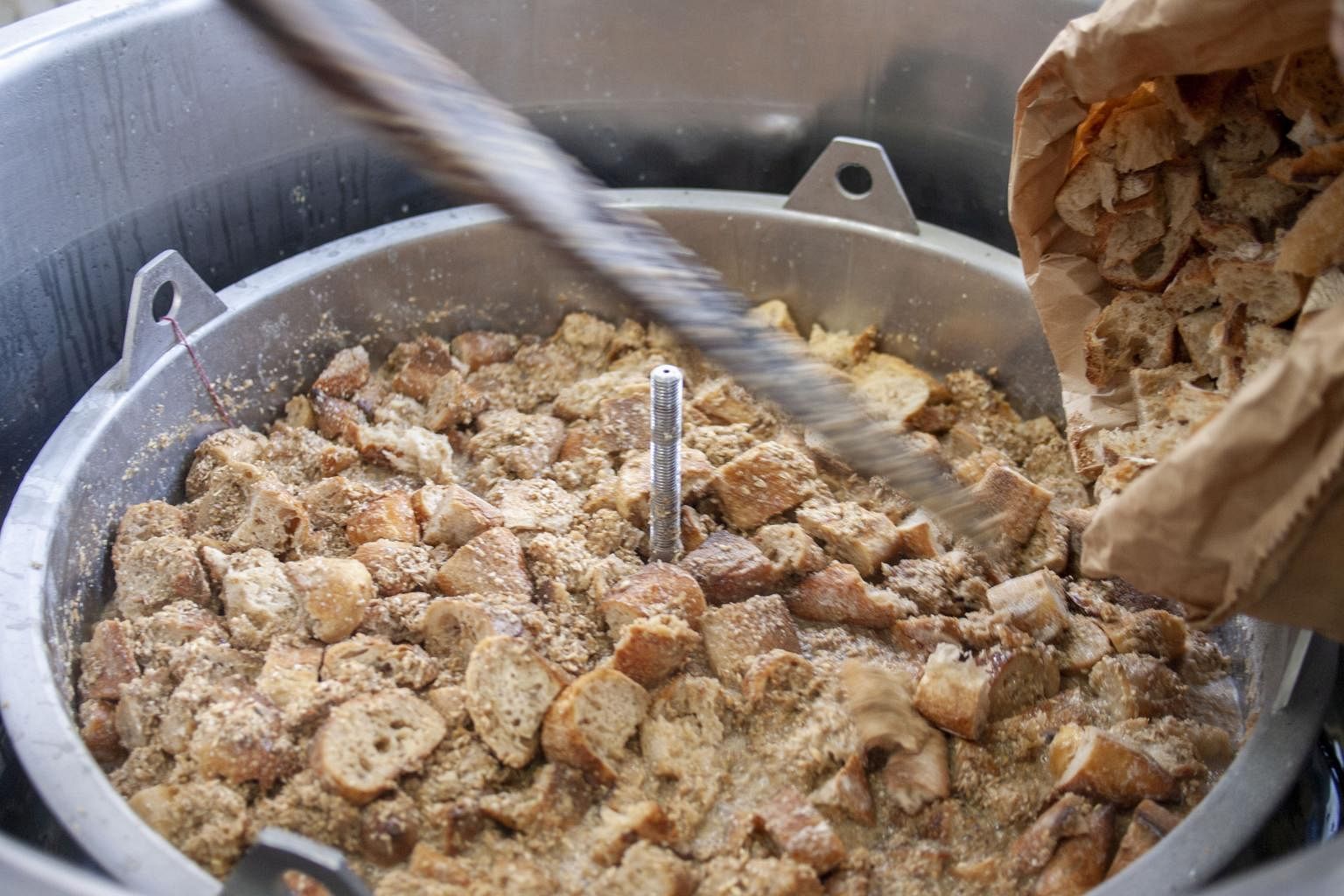
Last year, food waste accounted for 11 per cent of the total waste generated. Of the 665 million kilograms of food discarded, only 19 per cent was recycled.
Speaking at the award ceremony on Wednesday, Senior Minister of State for Sustainability and the Environment Amy Khor said: "More can and needs to be done to reduce the amount of food waste that goes to our incineration plants as valuable resources are wasted in their production, distribution and disposal."
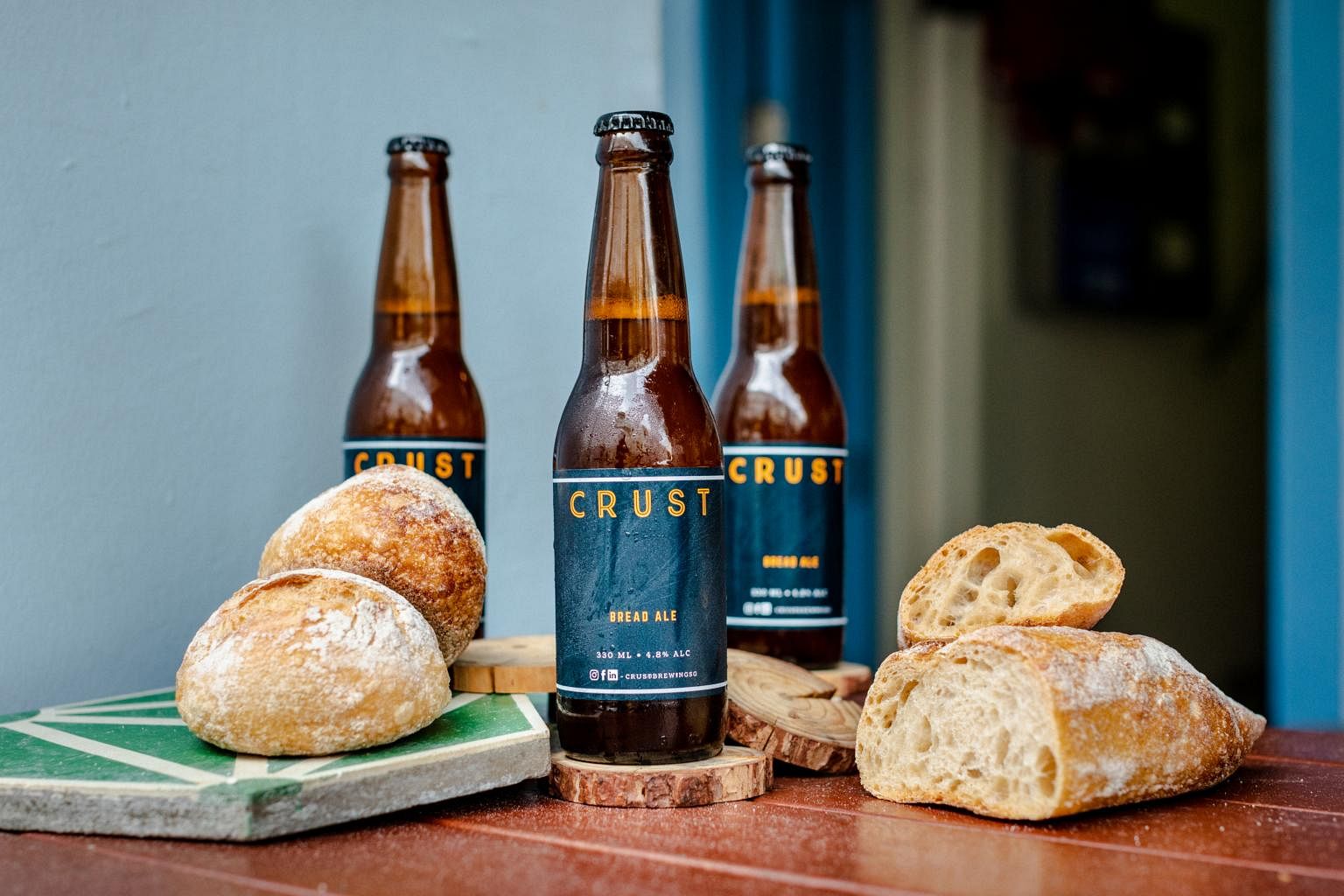
Another winner, Crust Group, concocts craft beer using unsold bread from bakeries as one of the raw ingredients in the brewing process.
Later this year, Crust will launch its range of fruit-based sparkling water, made from the peels and rinds of fruit and vegetables. Fermentation and heat treatment are used to extract the flavours for the sparkling water.
In furthering Singapore's zero waste vision, NEA also announced on Wednesday that four new research projects have been awarded grants to explore ways to conserve the country's landfill space.
In one project by Nanyang Technological University, researchers will work with external companies to study the waste dumped into parts of Semakau Landfill.
The project's aim is to find out if some buried materials can be excavated and reused as construction materials, for instance, to clear up more space in Singapore's only landfill.
Semakau Landfill is expected to be filled by 2035. To avoid this, the country aims to reduce the amount of daily waste sent to the offshore island by 20 per cent by 2026 and 30 per cent by 2030.
The grants were awarded under NEA's "Closing the Waste Loop" research and development (R&D) initiative, a $45 million programme that has awarded grants to 11 other projects since 2017.
Commenting on the new projects, NEA said in a statement: "Should these R&D projects succeed and subsequently get implemented, up to 100,000 tonnes per year, or almost half of Singapore's non-incinerable waste, stand to be diverted from Semakau Landfill."
In one project by Nanyang Technological University, researchers will work with external companies to study the waste dumped into parts of Semakau Landfill.
The project's aim is to find out if some buried materials can be excavated and reused as construction materials, for instance, to clear up more space in Singapore's only landfill.
Semakau Landfill is expected to be filled by 2035. To avoid this, the country aims to reduce the amount of daily waste sent to the offshore island by 20 per cent by 2026 and 30 per cent by 2030.
The grants were awarded under NEA's "Closing the Waste Loop" research and development (R&D) initiative, a $45 million programme that has awarded grants to 11 other projects since 2017.
Commenting on the new projects, NEA said in a statement: "Should these R&D projects succeed and subsequently get implemented, up to 100,000 tonnes per year, or almost half of Singapore's non-incinerable waste, stand to be diverted from Semakau Landfill."

